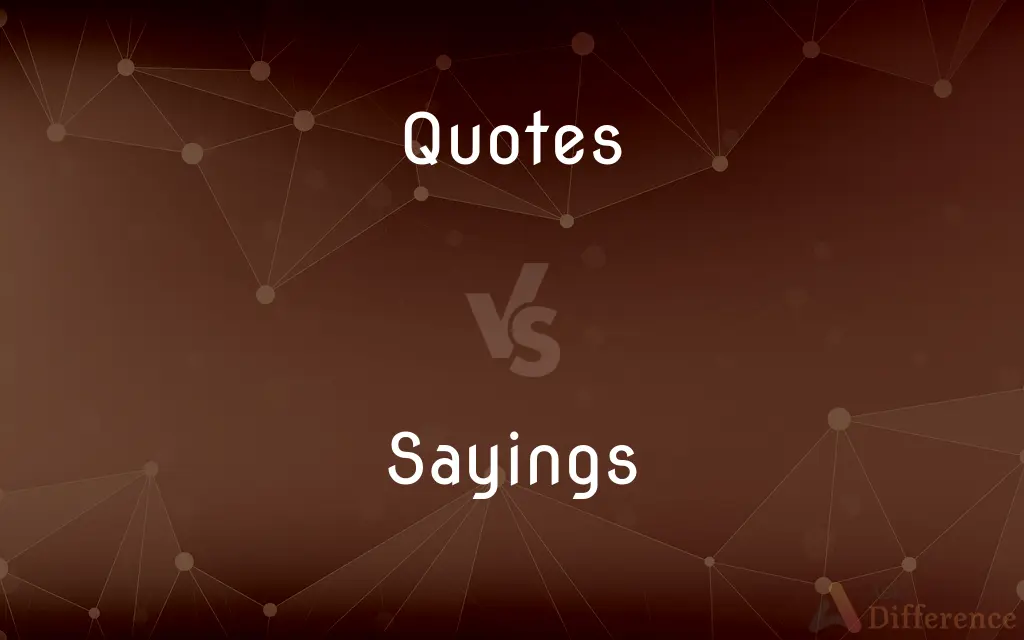Quotes vs. Sayings — What's the Difference?
By Tayyaba Rehman & Fiza Rafique — Published on February 3, 2024
Quotes are exact repetitions of someone else's words, while sayings are traditional phrases expressing common wisdom or observations.

Difference Between Quotes and Sayings
Table of Contents
ADVERTISEMENT
Key Differences
Quotes are precise reproductions of spoken or written words, attributed to a specific individual. They maintain the original context and are often used to convey the credibility or perspective of the quoted individual. Sayings, on the other hand, are familiar phrases or proverbs that express wisdom, beliefs, or moral lessons. They are not attributed to a specific person and often have a folkloric or traditional origin.
While quotes are exact and often cite the source, sayings are more flexible, allowing for variations in wording. Quotes reflect the thoughts, opinions, or expressions of particular individuals, capturing a moment in time. In contrast, sayings are timeless, representing collective wisdom passed down through generations.
The use of quotes is common in academic, journalistic, and formal contexts to provide evidence or support arguments. They are often referenced to maintain the integrity of the original message. Sayings, however, are used more colloquially and culturally, often reflecting common experiences or societal norms.
Quotes can change meaning when taken out of context, as their interpretation is closely tied to the speaker and the original situation. Sayings, however, generally maintain their meaning and relevance across different contexts due to their generalized and proverbial nature.
The distinction lies also in their function. Quotes are used for specific purposes such as argumentation, inspiration, or referencing. Sayings serve broader purposes, often used in everyday speech to convey truths, offer advice, or share cultural values.
ADVERTISEMENT
Comparison Chart
Definition
Exact repetition of someone else's words.
Traditional phrases expressing wisdom or observation.
Attribution
Attributed to a specific individual.
Not attributed to a specific person.
Contextual Dependency
Context-dependent for meaning.
Often context-independent.
Flexibility
Fixed wording.
Allows for variation in wording.
Use in Language
Formal, academic, specific referencing.
Colloquial, cultural, general wisdom.
Compare with Definitions
Quotes
A direct citation from a source.
She began her speech with a quote from Martin Luther King Jr.
Sayings
A commonly used phrase expressing a proverbial concept.
A stitch in time saves nine is a well-known saying.
Quotes
Repetition of exact words from a text or speech.
His essay included several quotes from Shakespeare.
Sayings
A colloquial expression of wisdom or truth.
His grandfather was fond of the saying, You reap what you sow.
Quotes
Verbatim extract for reference or support.
The journalist used a quote from the interview to highlight the issue.
Sayings
A traditional adage or maxim.
The saying, An apple a day keeps the doctor away, promotes health.
Quotes
A snippet of dialogue or text reproduced precisely.
The book's most famous quote has become a popular saying.
Sayings
A phrase reflecting common beliefs or observations.
The saying, Every cloud has a silver lining, speaks to optimism.
Quotes
A cited segment for illustration or emphasis.
She recited a poignant quote from her favorite poem.
Sayings
A folkloric phrase passed down through generations.
In her culture, the saying, It takes a village to raise a child, is often quoted.
Quotes
To repeat or copy (words from a source such as a book), usually with acknowledgment of the source
Quoted lines from Shakespeare in his lecture.
Sayings
Something, such as an adage or maxim, that is said.
Quotes
To repeat or copy the words of (a person or a book or other source)
Likes to quote Shakespeare when giving advice.
Sayings
Plural of saying
Quotes
To cite or refer to for illustration or proof
Quoted statistics to show she was right.
Quotes
To repeat a brief passage or excerpt from
The saxophonist quoted a Duke Ellington melody in his solo.
Quotes
To state (a price) for securities, goods, or services.
Quotes
To give a quotation, as from a book.
Quotes
A quotation.
Quotes
A quotation mark.
Quotes
Used by a speaker to indicate the beginning of a direct quotation
"He paused and said, quote, I don't care, unquote.".
Quotes
A dictum; a saying.
Quotes
Plural of quote
Quotes
Quotation marks.
Put his statement in quotes.
Common Curiosities
What is a quote?
A quote is an exact repetition of someone else's words, often cited for reference or illustration.
How are sayings used?
Sayings are used as traditional phrases to express common wisdom or observations, often colloquially.
Can quotes be paraphrased?
Quotes should not be paraphrased if the exact wording is important; paraphrasing changes them into indirect speech.
Are quotes always verbal?
Quotes can be from written or spoken sources, not necessarily just verbal.
Can sayings vary in wording?
Yes, sayings can vary slightly in wording while maintaining the same general meaning.
Do sayings have a known origin?
Sayings often have unknown or folkloric origins, unlike quotes which have specific sources.
Is a quote always attributed?
Yes, quotes are typically attributed to the person or text where they originated.
Are sayings used in formal writing?
Sayings are less common in formal writing, more often found in colloquial or cultural contexts.
What is an example of a famous quote?
"I have a dream" by Martin Luther King Jr. is a famous quote.
Do sayings convey specific or general ideas?
Sayings usually convey general ideas or wisdom, rather than specific thoughts or concepts.
Are quotes context-dependent?
Yes, the meaning of quotes often depends on their original context.
What is an example of a common saying?
"Actions speak louder than words" is a common saying.
Can sayings become outdated?
While sayings may vary in relevance, they often remain timeless due to their general nature.
Can quotes become sayings?
Sometimes, particularly memorable quotes can become sayings if they gain widespread usage and lose specific attribution.
How are quotes used in writing?
Quotes in writing are used for supporting arguments, providing evidence, or illustrating points.
Share Your Discovery

Previous Comparison
Interrupt in OS vs. Polling in OS
Next Comparison
WAV vs. MP3Author Spotlight
Written by
Tayyaba RehmanTayyaba Rehman is a distinguished writer, currently serving as a primary contributor to askdifference.com. As a researcher in semantics and etymology, Tayyaba's passion for the complexity of languages and their distinctions has found a perfect home on the platform. Tayyaba delves into the intricacies of language, distinguishing between commonly confused words and phrases, thereby providing clarity for readers worldwide.
Co-written by
Fiza RafiqueFiza Rafique is a skilled content writer at AskDifference.com, where she meticulously refines and enhances written pieces. Drawing from her vast editorial expertise, Fiza ensures clarity, accuracy, and precision in every article. Passionate about language, she continually seeks to elevate the quality of content for readers worldwide.













































